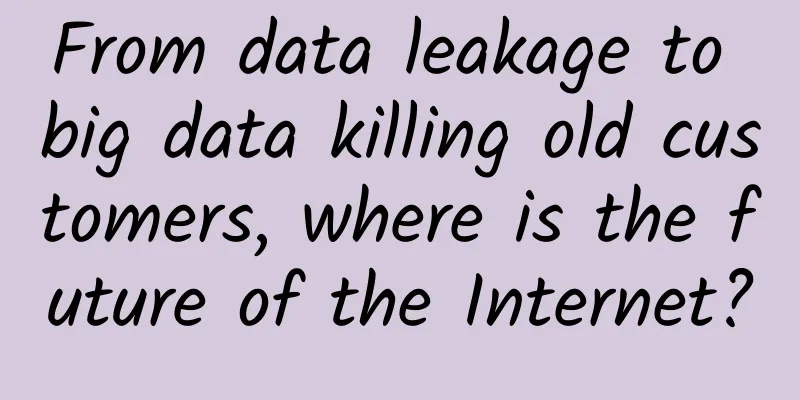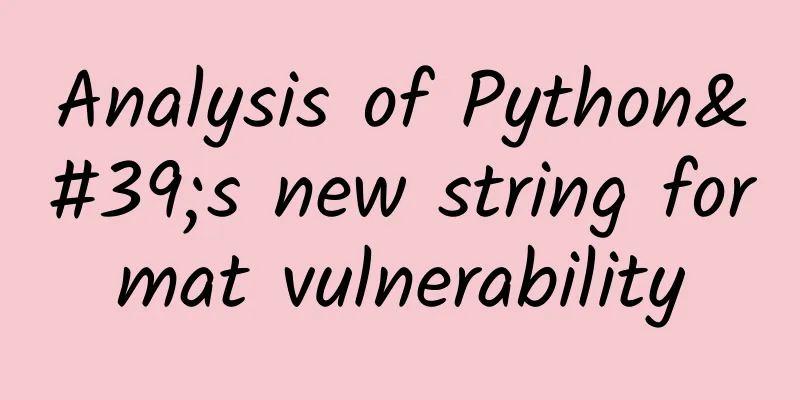From data leakage to big data killing old customers, where is the future of the Internet?

|
Since the birth of the Internet, the boundary between the virtual world and the real world has become increasingly blurred. We have become accustomed to working, studying, socializing, and other activities in the online world. Due to the characteristics of the Internet, we can throw away the constraints of reality and live a second life on the Internet. The basis of all this is that everyone's information is well protected. However, the recent exposure of privacy data leaks and big data killings also make people understand that the Internet is not a peaceful place.
When we log in to some websites that require registration, during the registration process, we have intentionally or unintentionally submitted our information to the background of the website, and users also instinctively believe that the website will not easily disclose their information, but this trust mechanism is obviously extremely fragile. The most common incident on the Internet: data breach The Internet's ability to make people forget about reality is one of the important reasons for the development of the Internet. In addition to making ordinary people feel convenient, it also allows some people with bad intentions to take advantage of it. Internet privacy data leakage is one of them, and it is also the most common accident on the Internet. Of course, some data leakage is just accidental. However, the leakage of private data will not only threaten the security of an ordinary user's online account, but also directly affect all aspects of his or her real life. The recent uproar over the leakage of Facebook user data has made users around the world feel insecure, and many celebrities have announced their withdrawal from Facebook, claiming to protect the security of their own private data. When it comes to the specific dangers of privacy data leakage, the following can be listed. First, it may cause the user's financial account such as Alipay, WeChat Pay, online banking and other account numbers and passwords to be exposed, and may be used by others to commit financial crimes and fraud; second, the virtual assets in the user's virtual account may be stolen and converted into cash; third, the leakage of privacy data will cause a large amount of advertisements, spam, e-commerce marketing, etc. to be sent to users, causing great inconvenience to users' lives. Of course, the above are just a few of the listed ones. The harm of privacy data leakage is certainly not limited to this. And because there is still a lack of effective means to prevent such incidents on the Internet, data leakage occurs from time to time. Most data breaches originate from within 2017 was the year with the most rampant data breaches. According to a recent report released by Gemalto, "2017 Poor International Security Practices Take a Toll", the amount of data stolen in the first half of 2017 alone exceeded the total amount of data stolen in the whole of 2016.
From January to June 2017, an average of 10.5 million records were stolen every day. Although many data breaches were caused by external hacker attacks, only 13% of the records were stolen or lost; in contrast, internal malicious leaks, employee negligence and unintentional leaks accounted for 86% of the 1.9 billion stolen data. These data also show that, when it comes to privacy breaches, the proportion of data theft caused by internal leaks is greater than that caused by hacker attacks. This is also an inevitable problem that must be taken seriously in the absence of effective supervision. Data collection itself is beneficial to both enterprises and users, which can help enterprises better serve users. If there is no data leakage, this seems to be a perfect solution. Users can get better services by submitting their own data. But the reality is obviously not that simple, and users may get a worse experience. Using big data of user classification to “kill familiarity” Some time ago, Didi was exposed for using big data to cheat its users, which caused a lot of public opinion. Obviously, not everyone likes to be treated differently, especially when the price is increased. Although Didi quickly clarified it, this method of using big data to cheat its users has been known to the world.
So what is big data price discrimination? Generally speaking, this behavior refers to using big data to judge the user's consumption potential. When a user is judged to be a high spender, the user will be treated differently, and his consumption price will be increased, making him spend more money than other users to enjoy the same goods and services. Online shoppers buying products at a discount are not new. This practice has been around since the birth of the Internet. In 2000, a notable online shoppers buying products at a discount also occurred. An Amazon user reported that after deleting browser cookies, the price of a DVD product he had browsed dropped from $26.24 to $22.74. As soon as the news came out, Amazon, which was under great pressure from the public, had to come out to explain that this feature was just an experiment of differential pricing for different customers and had absolutely nothing to do with customer data. In the end, it could only work hard on public relations to overcome this crisis of trust. Some Internet companies today have obviously forgotten what happened to Amazon back then and are trying to repeat the same mistake. Applications that force users to grant permissions Of course, as technology continues to improve, big data price discrimination can even make users unaware. Take e-commerce platforms as an example. The system can understand users’ preferences and budgets based on their historical consumption, browsing history, and screening conditions, and then display special search results for them.
Especially in China's special environment, since network supervision is not yet perfect, Internet companies can easily obtain users' daily network operation processes and profile them. In addition, in order to obtain more data, many mobile phone apps also set a variety of permissions, which require user consent before use. For example, map apps require users to open permissions to read, write, store and browse contacts. If users do not agree, they cannot use them. This forces users to disclose their private data and upload it to related companies. Through data analysis, these applications even know users better than they do themselves, making it easier for them to take advantage of their customers. This behavior of snatching users' information and then selling it back at a higher price also makes users feel inexplicably angry, but they can do nothing about it. Blockchain could be the key to solving these problems At present, we either leave the Internet or are forced to open our privacy to related companies, which seems to be a dead cycle that is difficult to solve. However, the emergence of blockchain has pointed out a direction for this problem.
The blockchain itself is also a decentralized distributed database. In the blockchain, each user can store data as a single node. After the data is uploaded, a backup will be generated in all blocks of the blockchain, which is equivalent to notifying all blocks on the chain so that everyone knows what happened. This can greatly prevent data from being tampered with and abused, and the right to use the data will belong to the uploader. Cryptographic algorithms ensure that everyone can only view their own data, send their own digital signature, and obtain the private key to decrypt the data. This can ensure that users have full ownership of their own data and avoid the possibility of data leakage and being exploited. The blockchain technology currently on the market is still far from mature, but its development prospects have been noticed by everyone. Changing the way data is stored will be the next major change in the Internet, which will be a boon for users. summary There is nothing wrong with technology itself. From the invention of the Internet to the emergence of big data, these technologies have undoubtedly brought us more convenience and made the world more colorful. However, technology has no likes or dislikes, but people have their own choices. When companies choose to use technology for evil, they may gain temporary benefits, but they will lose their own brand. Whether it is data leakage or big data price discrimination, it can be expected that it will continue to happen inevitably in the future when data is monopolized. Only by breaking this data monopoly and returning data rights to users can everyone get real benefits. |
<<: Under the SDN wave, where will traditional routing technology go?
Recommend
Six years after LPWAN became popular, what happened to non-cellular IoT technologies?
If you have to ask when LPWAN entered the public ...
Relax and have fun during the Dragon Boat Festival. WiFi signal must be strong. Here's how to adjust it
[[405404]] During the Dragon Boat Festival holida...
Why is there no movement in China for the popular wireless mesh network?
The wireless mesh network that emerged in the sec...
BandwagonHost: Los Angeles CN2 VPS annual payment starts at $46.7, 2.5-10Gbps bandwidth CN2 GIA line quarterly payment starts at $46.7
BandwagonHost VPS belongs to the old IT7 company....
Embedded development is ushering in a "soft power" revolution
The "Made in China 2025 Strategy" has e...
Nielsen: 5G enters a period of accelerated development, new scenarios give rise to new consumer demands
Recently, Nielsen, a global monitoring and data a...
Mobile Data and Broadband Outlook 2017: Consumers Expect More Inclusive Data Plans
According to foreign media reports, as an industr...
Is SD-WAN dead? The answer is of course no
At first glance, everyone must be shocked by thi...
Still don’t understand routing strategy? Let’s analyze it!
For IP network engineers, the deployment of routi...
From intelligent operation and maintenance to smart operation, Qingchuang Technology gives enterprises the ability to detective Sherlock
[51CTO.com original article] Operation and mainte...
Interesting, 5G base station and fire hydrant logo combined
Following the integration of 5G base stations wit...
JuHost: Hong Kong Kowloon VPS 40% off from $2.99/month, Japan VPS 30% off from $3.49/month
JuHost is a foreign hosting service provider esta...
South Korea's ICT exports hit record high in first half of the year
According to Yonhap News Agency, the Ministry of ...
If 12345G were in a WeChat group, what would they talk about?
[[269676]] Scene 1 The development and rise and f...
Facebook and Google plan to lay submarine cables from the United States to Southeast Asia
On March 29, according to foreign media reports, ...









